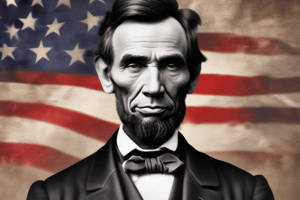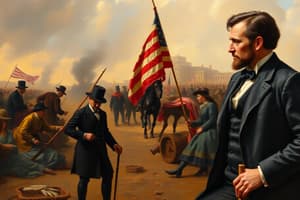Podcast
Questions and Answers
What did New England teacher Laura M. Towne observe about freed African Americans in her South Carolina classroom?
What did New England teacher Laura M. Towne observe about freed African Americans in her South Carolina classroom?
They were eager to learn.
What liberty did Southerners try to protect with their secession?
What liberty did Southerners try to protect with their secession?
The liberty to own, buy, sell, and transport slaves.
What policy regarding slavery did President Abraham Lincoln state in his inaugural address?
What policy regarding slavery did President Abraham Lincoln state in his inaugural address?
Leaving slavery alone in the South.
How did the constitution of the Confederacy differ from that of the United States?
How did the constitution of the Confederacy differ from that of the United States?
Who were the 'cooperationists' during the secession crisis?
Who were the 'cooperationists' during the secession crisis?
What would have been the consequence of the Crittenden Compromise, if passed?
What would have been the consequence of the Crittenden Compromise, if passed?
Once the Lower South had seceded, Republicans concluded that
Once the Lower South had seceded, Republicans concluded that
By the spring of 1861, most Southerners had concluded that
By the spring of 1861, most Southerners had concluded that
Who did Confederate president Jefferson Davis send to Charleston to seize Fort Sumter and defend the harbor?
Who did Confederate president Jefferson Davis send to Charleston to seize Fort Sumter and defend the harbor?
Why did Confederates open fire on Fort Sumter on April 12, 1861?
Why did Confederates open fire on Fort Sumter on April 12, 1861?
What was the consequence of President Lincoln's call for volunteers?
What was the consequence of President Lincoln's call for volunteers?
Which Confederate state experienced the greatest opposition to secession?
Which Confederate state experienced the greatest opposition to secession?
To what does the term 'contraband' refer?
To what does the term 'contraband' refer?
The first real test of Union and Confederate arms came in July 1861 at the
The first real test of Union and Confederate arms came in July 1861 at the
Which of the following best describes the significance of General Joseph Johnston during the first Battle of Bull Run?
Which of the following best describes the significance of General Joseph Johnston during the first Battle of Bull Run?
Who commanded all Union forces when the Civil War began?
Who commanded all Union forces when the Civil War began?
What was the title of the Union's plan to squeeze the Confederacy into submission?
What was the title of the Union's plan to squeeze the Confederacy into submission?
During the Civil War,
During the Civil War,
How did President Lincoln want his generals to conduct the war?
How did President Lincoln want his generals to conduct the war?
Who was selected to serve as president of the Confederate States of America?
Who was selected to serve as president of the Confederate States of America?
What was the most consistent source of tension in Confederate government?
What was the most consistent source of tension in Confederate government?
Who were Joseph E. Brown and Zebulon Vance?
Who were Joseph E. Brown and Zebulon Vance?
What was the most striking aspect of internal politics in the Confederacy?
What was the most striking aspect of internal politics in the Confederacy?
Why was the ironclad CSS Virginia not likely to make a difference in the Confederate's campaign?
Why was the ironclad CSS Virginia not likely to make a difference in the Confederate's campaign?
Which of the following is not true about the Union blockade?
Which of the following is not true about the Union blockade?
What was the South's greatest military advantage?
What was the South's greatest military advantage?
Which of the following was not a Confederate advantage?
Which of the following was not a Confederate advantage?
To win the Civil War, the North had to
To win the Civil War, the North had to
How did England respond to the South's expectation of assistance?
How did England respond to the South's expectation of assistance?
What motivated most Confederate soldiers to serve in the army?
What motivated most Confederate soldiers to serve in the army?
What motivated most northern men to serve in the Union army?
What motivated most northern men to serve in the Union army?
Flashcards are hidden until you start studying
Study Notes
Observations and Beliefs
- Laura M. Towne observed that freed African Americans in her South Carolina classroom displayed a strong eagerness to learn.
- Southerners sought to protect their liberty to own, buy, sell, and transport slaves through secession.
- President Abraham Lincoln, in his inaugural address, declared intentions to leave slavery undisturbed in the Southern states.
Confederacy vs. United States Constitution
- The Confederate Constitution explicitly stated white superiority over blacks.
- "Cooperationists" from the Upper South preferred to remain in the Union if the Lincoln administration cooperated with slave states.
Compromises and Consequences
- The Crittenden Compromise, if enacted, would have prevented Congress from barring slavery in new territories.
- Following the Lower South's secession, Republicans viewed compromises as yielding to southern demands.
Key Events and Leaders
- By spring 1861, most Southerners believed further compromise with the North was futile.
- Confederate President Jefferson Davis appointed General P.G.T. Beauregard to take Fort Sumter, leading to its seizure.
- The attack on Fort Sumter on April 12, 1861, was aimed at asserting Davis's authority.
Secession and Opposition
- Lincoln's call for volunteers to suppress the rebellion led to the secession of Arkansas, Tennessee, Virginia, and North Carolina.
- Virginia stood out as the Confederate state with significant opposition to secession.
Military Terms and First Battles
- The term "contraband" referred to runaway slaves captured by Union forces.
- The first major clash between Union and Confederate forces was the Battle of Bull Run, also known as Manassas.
- General George B. McClellan was the Union's commanding officer at the start of the Civil War.
Strategies and Roles
- The Union's strategy to defeat the Confederacy was known as the Anaconda Plan, aimed at strangling resources.
- Women served in the Civil War but were limited to noncombat roles.
- Lincoln emphasized coordinated attacks to prevent Southern armies from assisting one another.
Confederate Leadership and Internal Affairs
- Jefferson F. Davis was selected as president of the Confederate States, recognized as a moderate leader.
- States' rights consistently created friction within the Confederate government.
- Governors Joseph E. Brown and Zebulon Vance prioritized states' rights over Confederate success.
Political Dynamics and Military Challenges
- The Confederacy notably lacked a two-party political system.
- The ironclad ship CSS Virginia struggled to affect the Confederate campaign due to its limited maneuverability against the blockade.
- The Union blockade was effective, countering the South's reliance on blockade runners.
Military Advantages and Motivations
- The greatest military advantage for the South was defending its own territory.
- The Confederate navy was not viewed as a significant advantage.
- Northern soldiers were primarily motivated by the desire to end slavery, whereas most Confederate soldiers aimed to defend their property rights, including slavery.
International Relations
- England made no move to assist the Confederacy, refusing to break the Union blockade or recognize it diplomatically.
Studying That Suits You
Use AI to generate personalized quizzes and flashcards to suit your learning preferences.




